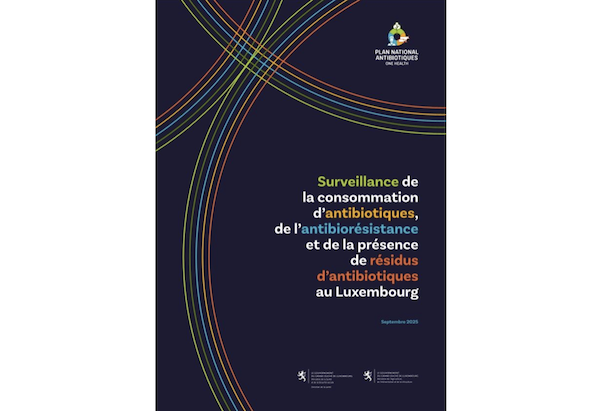
On Thursday 25 September 2025, Luxembourg’s Ministry of Health and Social Security and the Ministry of Agriculture, Food and Viticulture published the annual report on the monitoring of antibiotic consumption, antibiotic resistance and the presence of antibiotic residues in Luxembourg.
According to the World Health Organization (WHO), antibiotic resistance is one of the greatest threats to public health, affecting both humans and animals. The European Centre for Disease Prevention and Control (ECDC) estimates that more than 35,000 deaths occur each year in the European Union, Iceland and Norway due to infections caused by resistant bacteria. The ministries stressed that reliable and comparable data are essential to adjust public health measures in Luxembourg.
As part of the Luxembourg National Antibiotics Plan (NAP) 2018-2022, extended until 2024, the objective is to reduce the emergence, development and transmission of antibiotic resistance. This is being addressed using a global “One Health” approach that covers three sectors in particular: human health, animal health and the environment.
The report compiles the most recent national data on antibiotic consumption and resistance in both humans and animals, food safety monitoring and the presence of antibiotic residues in foodstuffs, animal feed and surface water.
Findings and recommendations
In human health, total antibiotic consumption in Luxembourg in 2023 was slightly above the European average and has been rising since 2021. Resistance rates remain mostly below the European average but are increasing compared to 2022. A decrease was noted in 2023 in resistance to fluoroquinolones among Gram-negative bacilli. The report recommends greater use of narrow-spectrum antibiotics where possible, avoiding off-guideline prescriptions, and reinforcing prevention measures such as vaccination, hand hygiene and infection control.
In animal health, Luxembourg remains among the European countries with the lowest antibiotic sales. Surveillance systems for resistance in food-producing animals and for food safety showed favourable results compared to the European average and neighbouring countries. Priorities include reducing the use of critical antibiotics and improving the monitoring of consumption, particularly through more comprehensive usage data.
For food safety and the environment, no non-compliant results for residues were detected in foodstuffs or animal feed in 2023. Residues were, however, found in surface waters at varying frequencies and concentrations. Their impact remains undefined, due to the absence of environmental quality standards and the limited number of analyses.
The ministries concluded that Luxembourg’s overall situation is satisfactory in comparison with European levels but underlined the need to continue efforts to meet the objectives of the June 2023 EU Council recommendation on strengthening the fight against antimicrobial resistance within the “One Health” framework. Work is already underway on a follow-up to the National Antibiotics Plan for the coming years.
The full report is available at: Rapport de surveillance de la consommation d’antibiotiques au Luxembourg 2025.








